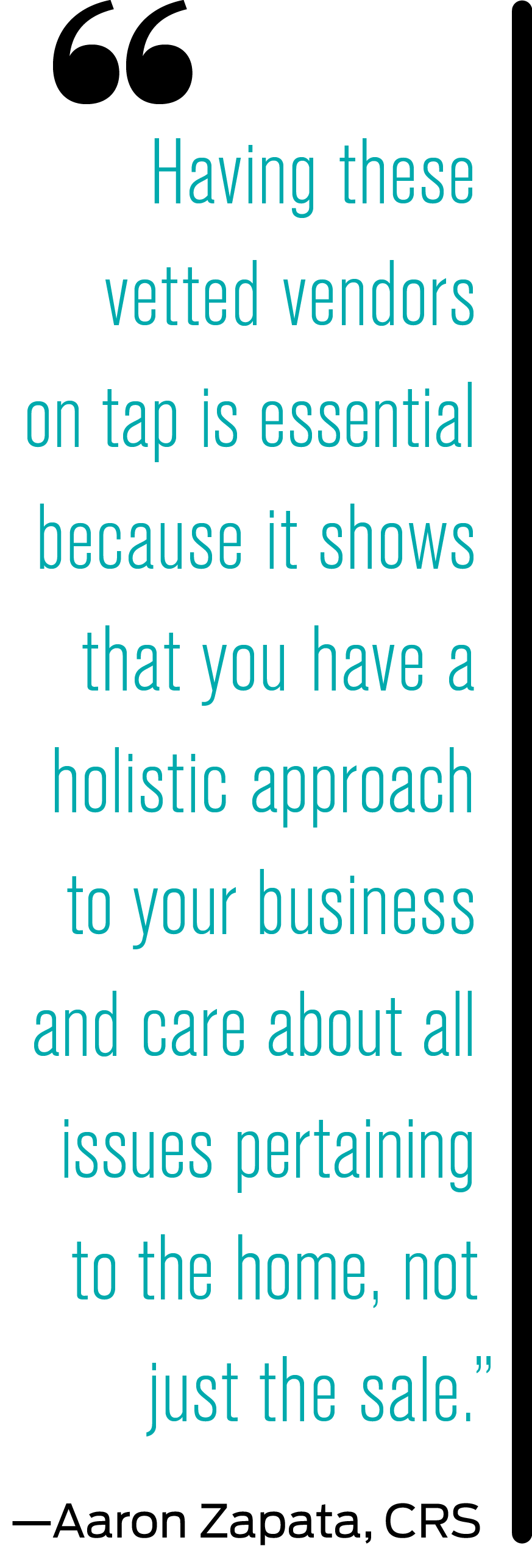To provide clients with the best service, agents should consider curating a list of preferred, trusted vendors to recommend
By Michelle Huffman
Savvy agents know they can’t do everything on their own—and they need trusted business partners to help.
That’s why so many CRSs cultivate a list of preferred vendors, with whom they often work so closely that they consider them extensions of their own brand.
 “Having a robust vendor list is a cornerstone of my business. I love that I can provide this information to my clients, and I’ll be seen as a continuing and valued resource,” says Kim Kerbis, CRS, broker with @properties in Chicago, who cultivates a 36-page list of vendors to share with her clients.
“Having a robust vendor list is a cornerstone of my business. I love that I can provide this information to my clients, and I’ll be seen as a continuing and valued resource,” says Kim Kerbis, CRS, broker with @properties in Chicago, who cultivates a 36-page list of vendors to share with her clients.
Aaron Zapata, CRS, broker/owner with IMPACT Properties outside Los Angeles, takes a slightly different tack, largely recommending a single preferred vendor. Having these vetted vendors on tap is “essential because it shows that you have a holistic approach to your business and care about all issues pertaining to the home, not just the sale,” he says.
To cut to the heart of it: “These people are your team,” says Jessica Olevsky, CRS, broker/owner of JPAR Stellar Living in the Washington, D.C. area.
But how agents develop and manage these relationships is a bit of an art form: Everybody has a different perspective.
How to Effectively Vet Vendors
Agents should consider a few key factors in the selection of vendors for their list. The vetting process often includes:
- Public reviews, largely pulled from Yelp and Google
- Personal interviews, especially with decision makers
- Recommendations from current clients or other agents
- References provided by other vendors
- Seeing their work in person where relevant
While REALTORS® have varied approaches on how to vet potential vendors, Kerbis relies on recommendations. “Over 20 years, I’ve developed a very extensive list, from divorce attorneys to dog walkers and everyone in between,” she says. “I like to think that instead of Angie’s List, it’s Kim’s List.”
Kerbis considers her list an essential resource to her clients, merited on both its breadth and variety, so the bigger, the better. She adds vendor categories to the list anytime she’s asked for a recommendation and doesn’t have one.
Who Should Be On Your List?
- Mortgage lenders
- Title companies
- Escrow companies
- Home inspectors
- Attorneys (especially where required by state law)
- Home remodeling specialists
- Flooring specialists
- Painters
- Handymen
- Movers
- Electricians
- Plumbers
With a list that big, she relies on her clients and fellow agents for recommendations, trusting their experience. She denotes on her list if she hasn’t directly worked with a particular vendor, providing transparency.
For Zapata, the value is in the individual recommendation. He has a multi-step vetting process, whittling it down to just a single carefully considered vendor in each major category.
He vets online first, then takes potential vendors out to lunch or coffee, paying careful attention to everything from how they present themselves to how they treat the waitstaff.
“You get a better idea of who each person really is, rather than treating it like a job interview where they’re trying hard to impress,” Zapata says.
Honing the perfect list
Many agents are quick to knock vendors who perform poorly off the list.
“I hold all my vendors accountable,” Kerbis says. “They know if they mess up, they’ve got me to deal with.”
Zapata similarly expects his vendors to provide excellent service, and if, for some reason, they don’t provide that service—or don’t call to tell him that something is affecting service like growing pains or a worker shortage—then they will be removed from the list.
Pay to Play … No Way
None of the agents we talked to accept any payment for putting a vendor on their list, and they make that clear to clients. Some agents, when offered a percentage of a job in exchange for being on their list, will tell the vendor to offer it instead as a discount to the client.
But honing the perfect list isn’t just about the stick to the proverbial carrot. It’s also about finding the right vendor for the right job. Many agents then work hard to find vendors like painters or flooring specialists at different price points, opening up more options for clients.
Kerbis takes it a step further and does a little matchmaking, suggesting specific vendors from her list to certain clients based on their personalities and properties.
Maintaining the relationship
Once a vendor is approved and listed, relationships often flourish naturally.
“It’s important to realize it’s a two-way street,” Olevsky says. “You need to be a good business partner to them, make sure you give them business and refer them out, and they know that when we call and need a favor, they help us out.”
Zapata does regular check-ins about once a quarter and has a face-to-face meeting with each about once a year. Many agents invite their vendors to client appreciation parties, exchange gifts during the holidays, sponsor events and, of course, share the compliments and even shout them out on social media.
A quality ongoing relationship will pay dividends, though that doesn’t often mean referrals. Many agents say these relationships are not inherently flush with referral opportunities. Primarily they receive
referrals from lenders, attorneys, movers and occasionally those in trade industries.
However, having this list not only helps clients during the buying or selling transaction but is a reminder of your services throughout their homeownership. Make it clear they can rely on you for recommendations whenever they need them.
“This has to be a win for the client, not for me or for the vendor,” Zapata says.
Finding the Right Fit
Finding the right vendor is more than just the vetting process. It’s also coming to an understanding with vendors about how the relationship will work.
“It’s important to align yourself only with vendors who match your level of service,” Olevsky says. “We are all about client care and offer concierge-level service, and we expect the same of the people we work with.”
“We have a very high expectation of ourselves, and that needs to carry on through every single vendor. That means we have that conversation upfront. I want to be clear with them: It’s not just simply giving out leads,” Zapata says. “I expect vendors to elevate their level of service with my clients. Being a preferred vendor is a pretty big carrot.”
Olevsky feels it’s also about the quality of the person she’s bringing into someone’s home. She wants to know they are respectful to her clients and property, show up as professionals in their industry, carry up-to-date licenses and insurance, and have top-notch reviews.
RRC has partnerships with businesses to help you save time and money. Check out all of the Council-approved vendors at CRS.com/about-us/partner/products.
Photo: iStock.com/SasinParaksa








